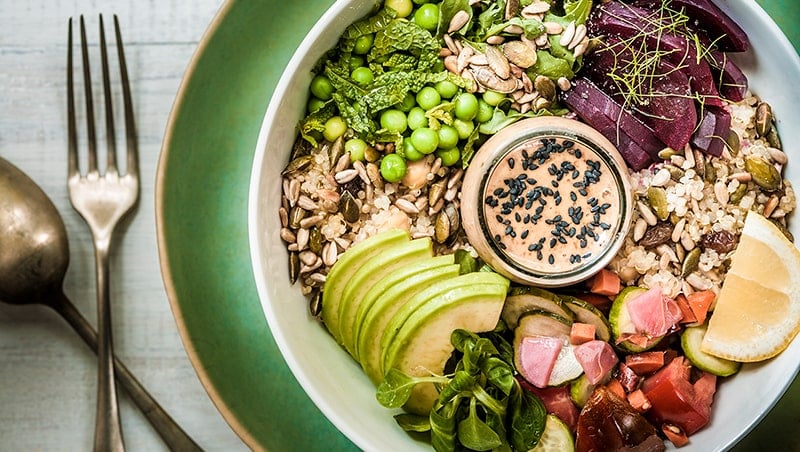
PCOS is an endocrine condition in which the female reproductive hormones are off-balance and result in infertility in women of childbearing age. Women who experience PCOS may have irregular periods, high androgen levels, and the frequent development of ovarian cysts. Although it is unclear what exactly causes PCOS, it is believed to be a result of increased insulin and androgens levels and usually affects overweight or obese women.
There is no cure for PCOS, and it often does not go away, even after menopause. However, it can be mitigated by improving your diet and losing weight. As we talked about in our first blog about PCOS, women who have polycystic ovarian syndrome are often insulin resistant. This leads to high blood sugar levels, and over time, type 2 diabetes.
How Your Diet Affects PCOS
PCOS does not cause insulin resistance. Instead, insulin resistance is either a result of genetics (patients with type 1 diabetes) or lifestyle habits (patients with type 2 diabetes). In women with a body mass index in the overweight or obese categories, insulin resistance can make it harder to lose weight, as is the case for many women who suffer from PCOS.
Similarly, if your body is resistant to insulin, it may try to produce more insulin to keep your blood sugar levels regular. Levels of insulin that are too high can cause your ovaries to produce more androgens, such as testosterone. 
The PCOS Diet
Insulin resistance as a result of a patient’s diet is caused by eating high sugar and high carb foods. However, other foods can heighten the symptoms of PCOS in women too. It is essential to not only follow these dietary guidelines but also to follow a regular eating schedule. This will help keep your insulin levels stable throughout the day.
So, how can a woman better control her insulin resistance and, ultimately, her PCOS symptoms through her diet?
Cut the Carbs and Sugar.
Refined carbohydrates and sugars not only increase blood sugar and make it harder to manage insulin levels, but they also cause inflammation within the body. By eating fewer carbs and sugar, blood glucose levels will lower, and fewer androgens (aka testosterone) will be produced.
Try to avoid processed and packaged foods/drinks such as pasta, bread, pastries, desserts, cereals, sodas, teas, juices, sugary coffee drinks, etc. Also, look out for the other sneaky names for sugar that the food industry adds to packaged foods—sucrose, dextrose, and high fructose corn syrup.
As a bariatric patient, you should already follow these dietary guidelines to limit your sugar and carbohydrate intake.

Watch out for Starchy Foods.
As a bariatric patient, you should be limiting your intake of starchy vegetables such as potatoes, beans, peas, corn, and squash, especially before you are six-months post-op. This is because most starchy vegetables have more sugar and more carbs, making it harder to 1) lose weight after bariatric surgery and 2) manage your insulin levels if you have PCOS. Luckily, there are a lot more non-starchy vegetables than starchy vegetables to pick from.
After you are six months post-op, you can begin eating a small amount of starchy vegetables. Just be sure to choose the high-fiber varieties.

Eat More Fiber.
Fiber is a plant-based nutrient known to improve satiety and health while also aiding in weight loss. A high-fiber diet can slow down the absorption of sugar in the blood and improve blood glucose levels. Through blood sugar management, fiber can help combat insulin resistance and improve PCOS symptoms in women.
High-fiber food options for bariatric patients include broccoli, cauliflower, Brussels sprouts, leafy greens, and green and red peppers. Other high-fiber options that must be eaten in moderation after weight loss surgery are almonds, berries, sweet potatoes, squash, beans, and lentils.
Be Conscious of Fat Intake.
Insulin resistance can be attributed to higher than normal amounts of fat in your blood. Studies have shown that free fatty acids floating around in your blood cause cells to not respond to insulin properly. These free fatty acids are caused by excess weight and high calorie, high-fat consumption.
Not only do you want to limit your fat consumption, but you also want to focus on eating healthy fats. Saturated fats found in high-processed meat products, and trans fats (hydrogenated oils) are inflammatory foods that can worsen insulin resistance and PCOS symptoms.
Therefore, you want to be sure you limit your intake of red and processed meats (hamburgers) and high-carb, greasy foods like donuts, french fries, and pizza. Focus on lean protein such as skinless chicken breast, turkey, egg whites, greek yogurt, shrimp, tilapia, and beans.
Avoid Inflammatory Foods.
Many PCOS patients have inflammation in their gut, which can be exacerbated by eating foods that create an inflammatory response.
“Because women with PCOS have been shown to have low-grade inflammation, elevated inflammatory signals can raise insulin, contributing to worsening of PCOS symptoms,” says Angela Grassi, MS, RD, LDN, founder of The PCOS Nutrition Center
As mentioned above, high-calorie, high-fat foods can have an inflammatory result that will worsen insulin resistance and PCOS symptoms. Try to avoid fatty meats and foods that are covered in grease. Instead, eat anti-inflammatory foods such as tomatoes, kale, spinach, blueberries and strawberries, olive oil, and fish high in omega-3 fatty acids. These foods will reduce inflammation, improve your cardiovascular health, and help you manage your PCOS symptoms.

Fuel Up on Protein.
We can not stress this enough, especially after bariatric surgery — eat more protein! Protein will improve satiety, allowing you to feel full for longer, and help with weight management. Just be sure you choose low-inflammatory, lean protein options that include tofu, chicken, and fish.
Long-Term Dietary Changes to Manage PCOS
Although polycystic ovarian syndrome will never go away, there are methods of managing it. A drastic change in your diet may seem overwhelming, but you can mitigate your symptoms by taking proactive steps when in comes to your diet and your weight.
There is no one-size-fits-all when it comes to the best food plan for patients who have polycystic ovarian syndrome. We encourage you to try out various healthy food options to see what works best for you in managing your PCOS.












